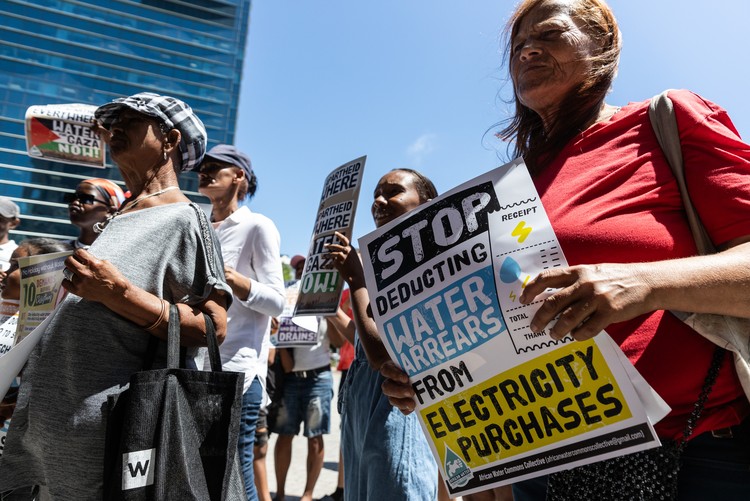Picket against “water apartheid”
There’s enough water - the problem is allocation, says protester
About 60 people gathered at the Cape Town Civic Centre on Thursday to highlight their concerns about the municipality’s water policies. Photo: Ashraf Hendricks
Dozens of people picketed outside the Cape Town Civic Centre on Thursday morning calling for an “end to water apartheid”.
The protesters had numerous demands, including the water management devices the municipality has installed in their homes. These limits the amount of water that comes out of a tap once the household has exceeded its allowance. This is known as the drip system.
The picketers also called for the City of Cape Town to stop deducting water arrears from electricity purchases and the City to fix broken pipes and blocked drains.
“When land was taken, water was taken. Land hasn’t been given back. Water hasn’t been given back,” said Koni Benson of The African Water Commons Collective, a water activist group that organised the protest.
Benson said that since 1994 water has been commodified and people who don’t have money don’t have access to what is a “basic human right”. She claimed that those in need are not getting enough water and that the City does not take into account the size of families on a property.
“It’s a political problem, not a personal failure,” said Benson. She said that there is enough water, but the issue is the allocation. Benson said that the City should not be targeting those in need but rather wealthy households and corporations.
A study published earlier this year found that more than half of Cape Town’s municipal water supply is used by the wealthiest 14% of households. On the other hand the City’s indigent support policy offers free or discounted services to over 40% of Cape Town’s households. Households with an income of R7,500 or less benefit. This includes a free water allocation of 15 kilolitres a month and 60 free electricity units a month.
Ellie DeWee, a pensioner, lives in Elsies River. Her water bill is well over R4,000, and this is after a water management device was installed on her property. She disputes that she has been charged the right amount. “I can’t afford it,” she says. She lives with her son and the only income she has is her old age grant. She says most of her money goes to food, then electricity and clothes. “How must I live the whole month?” she asked.
A memo was handed over to a City official promised to get back to the protesters.
Next: As Israel wages war, Jews and Muslims in Cape Town show a peaceful way
Previous: Metrorail shack dwellers moved, but to a place without toilets or water
© 2023 GroundUp. This article is licensed under a Creative Commons Attribution-NoDerivatives 4.0 International License.
You may republish this article, so long as you credit the authors and GroundUp, and do not change the text. Please include a link back to the original article.
We put an invisible pixel in the article so that we can count traffic to republishers. All analytics tools are solely on our servers. We do not give our logs to any third party. Logs are deleted after two weeks. We do not use any IP address identifying information except to count regional traffic. We are solely interested in counting hits, not tracking users. If you republish, please do not delete the invisible pixel.



